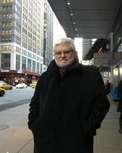 Chris
McDonnell, UK
Chris
McDonnell, UKchris@mcdonnell83.freeserve.co.uk
 Chris
McDonnell, UK
Chris
McDonnell, UK
chris@mcdonnell83.freeserve.co.uk
Previous articles by Chris
Comments
welcome here
January
26, 2017:

Dates
have a significance in our lives. It might be a personal occasion, a
birthday, the date of our marriage or the death of a parent. We remember
such dates within the context of our family or with a few close friends.
Other
dates are observed across a much broader range, national dates of great
import, international dates that are imprinted in our collective memory.
Since that fateful day in 2001, the phrase ‘nine-eleven’ means only
one thing.
Now
as we approach the end of the first month of a new year, the date of the
27th is set aside as Holocaust Memorial Day, marking as it does
liberation of Auschwitz-Birkenau, the largest Nazi death camp established
during the Second World War.
No
words are adequate to begin an approach to
that organised horror so why set a date in association with such an
obscenity? There is a collective response to tragic events when we feel
the need to support each other, to share our grief and to give others the
chance to share theirs. We see this in the immediate aftermath of
accident, natural disaster or sudden death. There is comfort in the
strength of a hand-hold or clasp of arms round someone shaking with grief.
We are not solitary individuals, walking a path of loneliness but caring
companions, gregarious in our response to another person’s journey.
That
was the essence of the walk to Emmaus, the companionship of two men,
puzzled, confused even fearful. Then they are joined by a third who brings
re-assurance, teaching through comforting words, offering explanation. And
‘their hearts were warmed’ by his presence.
Goodness
knows, our present times offer a background of difficulty and pain to our
life story, a time of strife between nations when indiscriminate terror
has become the currency of normality. After a time there is a risk of
immunity to each successive event and the television images become common
place and loose their impact. We move through the news story and on to the
sports desk, with only a lingering memory of an up-turned boat or a
solitary child standing on a dusty path. Society has even given it a name-
compassion fatigue. Once
labeled, we move on.
But
that should not, cannot, be the Christian response. The mark of so many of
those we call ‘saints’ for want of a better word, has been precisely
the sense of being undefeated even in the most difficult of circumstances.
Knocked down, they get to their feet and continue their task of
companionship.
Very
often, their strength comes from the difficulties they have previously
experienced, the example offered by their immediate family, the lessons
learnt from the streets of their childhood. Whatever the background we
come from, it is the challenge of our faith to be generous with our person
and our time.
Such
response might be considered as the expression of a social conscience seen
in others who live without the context of faith. But when we ask the
deeper questions, about faith and its influence on our actions, then it
becomes apparent that our strength is rooted in the Gospel and the daily
prayer that is our practice.
Those
who have given us an example of faith through action and whose quality of
life has been recognised, have what we call ‘a feast day’, a date set
aside to remind us of who they were, what they did and the example that
they set.
And
there is the significance of marking Holocaust Memorial Day, to bring to
our attention the consequence of outrageous behavior and disregard for any
basic human value. But it does more than that. It reminds us that even in
the midst of such debased actions, individuals showed marks of hope and
trust. The reflection that follows was written back in 1995. We’ll leave
it there.
“Words
do not come easily –or perhaps they have come with too much ease over
the intervening years and so have been devalued.
day by day by day by day
day by day by day by day
and trains,
leaving empty, collected further families from other places, faces without
future. In that chilled space, snow-bound in Winter under grey-grown sky,
sun-soaked in Summer through July-long days, it made no difference.
They simply sliced the life of David’s people and sent clouds of
darkness, wind-blown free beyond the fence,
leaving lost ones whose turn must come. Maybe in the morning”.
END
-------------------